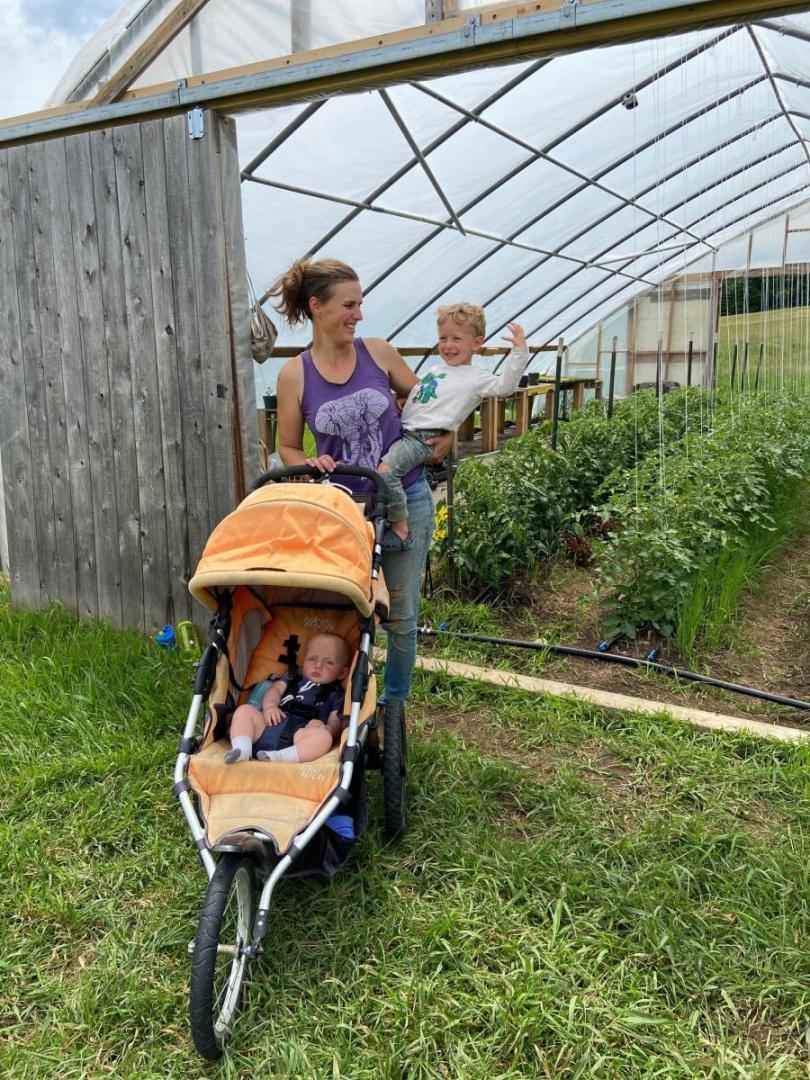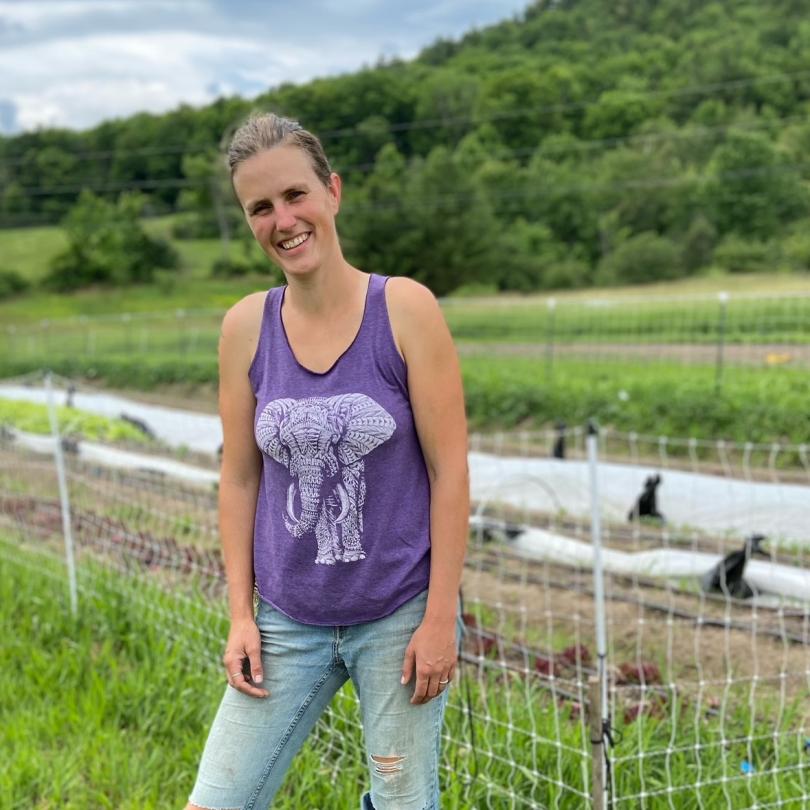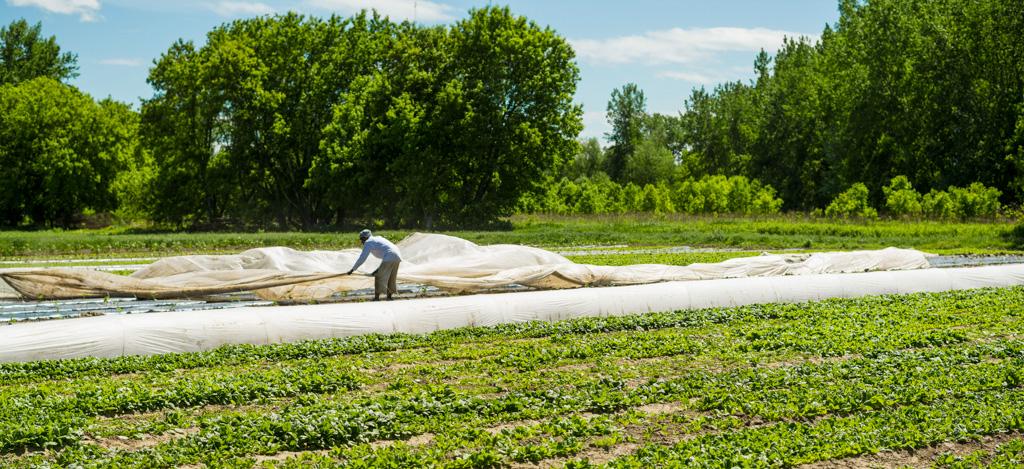Hannah Doyle is the owner of Boneyard Farm in Fletcher where she and her husband, John, recently purchased an old dairy farm with help from the Vermont Land Trust. They raise pastured pork and chickens, grow vegetables for their farm stand and farmers markets, and are busy setting up their new place. Hannah participated in NOFA-VT’s, “Help! I’m Farming and Caretaking in a Pandemic!” series this winter, and on a Tuesday in mid-May, she took a break from planting to talk with me more about the juggle of farming and parenting.

Kate: Before we get into farming and parenting, I’d love to hear about how you got into farming.
Hannah: I grew up homesteading. My family always had a really big garden, we made maple syrup, we raised sheep, cows and pigs as household livestock, just to feed our family. So it was always part of my life. Knowing where your food came from was important but it wasn't dogmatic — it was just how we did it growing up in rural Vermont.
I worked on other people's farms for a long time and really loved the lifestyle of waking up early and working hard outside all day no matter what weather was thrown at us. The tangible work of farming really means a lot to me. Eventually, I ended up at a year-round farm and managed their hoop houses and home farm operations. I loved being in a management position, organizing people's strengths and all the tasks that had to happen on a farm.
Then in 2017, I got pregnant and couldn't stay there because they didn't offer health insurance. I was six months pregnant when I left. It was so clear to me that I wasn't going to be able to get to someone else's farm at 6:30 every morning and stay till 8pm. That's when I decided to become a farm-at-home mom. It made a lot of sense to come home and help my husband with his business. We already had a homestead on the side, and were selling chicken and pork shares to family and neighbors, so we had a proof of concept.
Kate: I’ve talked with other young farmers who’ve said that they don’t see how they’ll be able to turn farming into a career because they didn’t have health insurance.
Hannah: It's so common for farmers to not have health insurance. Then there’s also the schedule and the demands of working for someone else. I felt like there was no path for me to be a parent working on someone else's farm, but this is the work that I really really want to do.
When I was managing someone else's farm I had a ton of responsibility and a ton of work, but I didn't have the flexibility. I was so excited to have my own farm because I knew that in the heat of the day, I could go indoors with my kids. Like last week was really hard for [my son] Reuben. He's 3 and he's had a ton of huge changes in his life recently. So I had to just say, "I'm not going to get that much done on the farm this week. I'm going to keep the animals alive and focus on parenting."
It's that kind of flexibility that I really looked forward to in having my own farm and schedule. You're working 7 days a week, but not necessarily 14 hours straight. There's always work to do, but you can also go inside to get a popsicle whenever you want.
Kate: What are some challenges you've felt, specifically as a mother and a farmer?
Hannah: There's so much I could say. The physical and mental workload is often underestimated. It’s tricky because people think it's very quaint, like you get to be relaxing on this beautiful farm with your children all day long. But farming is not relaxing. There are moments of great joy and beauty and serenity, but also — I'm putting out fires all day long, problem solving and trying to work around animals and children, and dragging hoses from one end of the farm to the other with a double stroller and a bucket. Every single task is made more difficult because there are kids involved.
Kate: If you could go back and tell your pregnant self something from your current self, what advice would you give?
Hannah: I think the advice I’d give to first time pregnant Hannah is the same advice I'd give myself now, which is to manage expectations better than I'm doing. I am my own worst critic and my own biggest source of pressure and stress. I always want things to be perfect and on time, and I'm so high-strung about a lot of things I don't need to be high-strung about. I'm getting a little better at it, which is why I'd give the advice to younger me to just relax and enjoy it more than I do.
I often feel this invisible pressure from my customers, who are literally just cheering me on. I think they're going to be so disappointed if I don't have lettuce at the first farmers market, or they're going to say, ‘what do those people think they're doing buying this 180-acre farm when they just have 20 pigs and 140 laying hens?’
But no one is saying that at all. They're just happy we bought this farm and we're doing something, and I'm out here working my butt off every day. They're not disappointed in me and I don't need to put that on myself.
It’s important to celebrate the wins more. My kids are happy, all the animals got water today and we do have a beautiful life, and somehow I'm still going to get something to the first farmers market this year, despite having moved a month ago and having a four-month old baby and a toddler and a million things to do.
So I'd say go easy on myself, and know that people around me are actually cheering me on.
Kate: I judge myself, too. We get all these societal messages that mothers are supposed to do everything, and do it really well, and it's not good enough to just sit and be with your kid, or sit and celebrate the wins, because there's 20 other things you need to get done and you need to get it done perfectly. Every time I talk to someone about this, I realize it's not just me being hard on myself.
Hannah: It's everybody. Yeah, it definitely helps to have solidarity. Like the NOFA-VT’s Zoom calls about caregiving and parenting during a pandemic this winter, it was helpful to say I'm not doing this alone, and there's a whole bunch of mostly women caretakers out there who are struggling with these same things.
Sometimes I feel pressured to want to parent all the time. It would be totally warranted for John to have a construction business and for me to "just" be a stay-at-home mom. I have these two kids and they demand a lot from me. I could just be hanging out in the shade in the backyard playing in the sandbox, but I want to be working on my farm.
Sometimes I also feel this guilt about trying to be productive while parenting. I'm shaming myself for being productive and being unproductive at the same time. I'm darned if I do and darned if I don't. If I'm transplanting lettuce, I'm feeling guilty that I'm not parenting. If I'm parenting then I'm not only feeling guilty that things on the farm should be getting done, but I want to be doing those things. I like doing those things. That's my passion and my career choice, and I can't do it right now because of this time of my life. That can sometimes lead to some resentment and I feel gross about it, but I also want to be able to say that. I don't love being a mom 100% of the time. There are days I can really use a break from it.
I've been working so hard for a decade to get to where I am right now, to own my own large farm and be setting it up, and then to have to take a break to wipe a bum...it's frustrating some days. AND I love love love where I am and what I'm doing. But I want to be able to say, this kind of sucks sometimes.


Kate: It does, and I think it's really important to say all of those things. I’ve been reading a book called Hunt, Gather, Parent, about parenting in the US versus parenting in most of the rest of the world, where Indigenous approaches to parenting are still the norm. One thing I’ve learned is that the idea of a stay-at-home parent and making everything kid centered is atypical for how humans have developed.
There's a lot of benefit to having your kids helping and working alongside you, or having other people coming in to help, too.
Hannah: Yeah, that's nice to hear. That's comforting. Sometimes I get bored if all I'm doing is playing with my kids all day long. It's not enough for me and I want to be doing something else. There's so much benefit to Reuben doing all the animal chores with me everyday. Yesterday we went and picked up pork and he handed me all the pork out of the boxes and I added it up and put it in the freezer. He's always right there with me, helping in any way he possibly can, and I think that's going to make him a confident and competent kid. He's also learning numbers by counting the packets of seeds we're going to put in the ground, or doing real applicable work.
Kate: Toddlers are wired to be helpful. They want to be part of it, and there's a lot of skill building that does come from all those things you just said.
Hannah: Yeah, he's in a real, "I can do it myself" phase, so I'm like, alright do it yourself, no problem, but I'm going to give you some tips.
I did my honors project in college about gender identity in rural farm women. One of the women I interviewed said to me she raised her kids with benign neglect. Now I'm like, oh yeah that's what I do. My kids are sitting in strollers or playing by themselves, and I'm getting stuff done and they're fine. I'm not doting on them. I'm respecting them as people and trusting them with tasks and listening to them, but not fixing every problem for them.
Kate: Are there any types of support that you’d like to see put in place for farming families that aren't there now?
Hannah: I would say health insurance is the #1 thing, especially for self-employed folks whether they're farmers or contractors. Access to child care for people in general is a really great thing and should be more affordable.
Kate: To close, what do you appreciate about farming and parenting?
Hannah: I really appreciate being with my kids, even on days when I wish someone would swoop in and take care of them. When my inlaws are here and are with my kids for 4 hours, I really miss them. I really appreciate getting to know them. I love getting to know Reuben and being in the know on all his inside jokes. He's such a fun person.
I also appreciate the flexible schedule. Both the day-to-day and week-to-week, but also seasonally. I enjoy being home together in the winter. My husband's business is also seasonal; we always have work to do — there's always livestock and business planning, bookkeeping, taxes, websites, and all that stuff — but there's also down time. I love working together as a family. The flexibility and the connectedness of family small business is everything to us right now.

